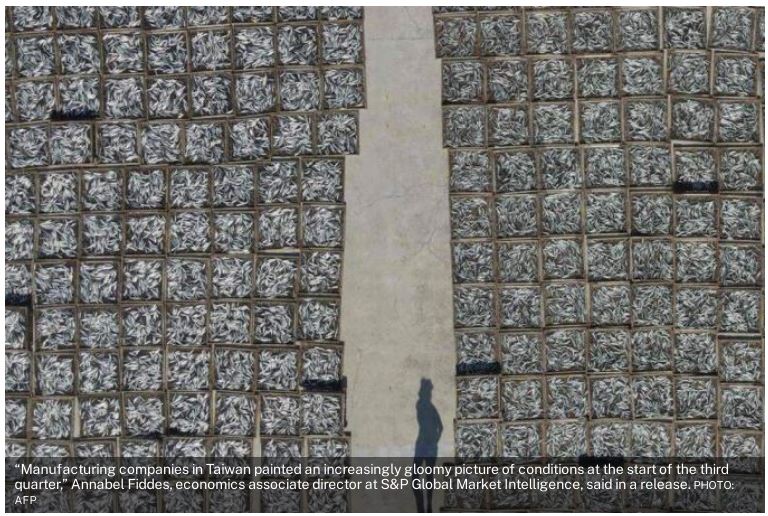Asia factory activity tumbles on supply, weaker demand
ASIA’S factories continued to report weakening activity in July amid lingering supply chain complications and a slowing global economy.
Purchasing managers’ indexes for South Korea and Taiwan took the biggest hit, according to S&P Global.
South Korea’s July PMI slumped to 49.8 from 51.3 in June, its lowest reading since September 2020. New orders contracted and weakened the most in nearly 2 years while output volumes slid at the fastest pace for 9 months due to shortages of materials and rising costs.
Taiwan’s PMI reading fell to 44.6 from 49.8 while output fell to 40.2 from 45.9 in June. The PMI, output and new orders were at their weakest since May 2020. A reading above 50 indicates expansion from the previous month, while anything below indicates contraction.
Currencies weakened against the US dollar after the news, led by the South Korean won and the Philippine peso. The Taiwan dollar fell to the key psychological level of 30 per the greenback for the first time in more than 2 years.
“Manufacturing companies in Taiwan painted an increasingly gloomy picture of conditions at the start of the third quarter,” Annabel Fiddes, economics associate director at S&P Global Market Intelligence, said in a release.
“Output and new business both fell at the sharpest rates since the early stage of the pandemic in May 2020, with firms often linking this to weaker global economic conditions.”
Data on Sunday (Jul 31) showed China’s factory activity unexpectedly contracted in July, reversing earlier economic momentum as sporadic Covid-19 outbreaks weigh on the recovery.
The official manufacturing purchasing managers index fell to 49 from 50.2 in June. That compares with the 50.3 median estimate in a Bloomberg survey of economists.
A private sector gauge also showed renewed weakness as the Caixin Media and IHS Markit PMI slipped to 50.4 from 51.7 and new orders fell.
The slide in Asia’s export powerhouses is a clear warning for where global demand is headed as central banks aggressively raise borrowing costs to slow soaring inflation.
The International Monetary Fund last week lowered its global growth forecasts and warned of heightened recession risk.
Elsewhere in the region, PMI readings for Vietnam, Philippines and Japan fell while Thailand, Indonesia, and India’s picked up. BLOOMBERG


 Thailand
Thailand




